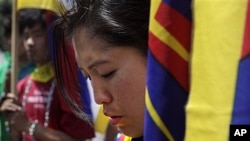The Chinese government accuses the United States of having the "wrong facts" about a stand-off between monks at a Tibetan monastery and security forces in western China. A Chinese spokesman says the monks are leading what he describes as a normal life and says the United States is acting irresponsibly by commenting on the matter.
Chinese Foreign Ministry spokesman Hong Lei reacted strongly Tuesday to recent criticism made by the United States about the use of force by the Chinese authorities at the Kirti monastery in Sichuan Province, which boarders Tibet.
A U.S. State Department spokesman said the intervention of security forces was inconsistent with internationally recognized principles of religious freedom and human rights.
Hong Lei says the remarks were wrong and that the United States should get its facts right. He is calling for Washington to stop making what he describes as "irresponsible remarks."
Hong says the 2,500 monks at the monastery enjoy what he describes as a normal life and normal religious activities. He says the local government and police have formed a "joint patrol team" to stop unspecified people from entering the monastery.
In spite of reports that Chinese forces are keeping food and supplies out of the monastery, Hong says there is an adequate supply of what he describes as "goods" at the monastery, and those involved are acting in a friendly way.
Reports say clashes erupted at the monastery after a monk set himself on fire and died last month. Police were reported to have unleashed dogs on residents outside the monastery and beaten people when they tried to prevent forces from entering the compound last week.
A security cordon remains around the monastery, which lies in western Sichuan province, near Tibet.
Tibetan spiritual leader, the Dalai Lama, has urged restraint in the stand-off.
The unrest started on the third anniversary of anti-government protests in the area.
Across Tibetan regions of China, resentment against Chinese rule runs deep.
Many Tibetans are angry about what they view as increasing domination by China's majority Han ethnic group. They accuse the government of trying to dilute their culture.
Tibetan resentment erupted into violent demonstrations in March 2008 in Tibet's capital Lhasa, and spread to neighboring areas. Security has since been heavily beefed up in the region, adding to the friction and resentment.
China says Tibetan living standards have improved markedly in recent decades, pointing to billions of dollars spent on infrastructure and development projects.
China Labels US 'Irresponsible' About Monastery Reaction




